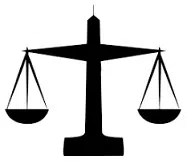 The concept of judicial comes from iudiciālis , a Latin word. It is an adjective that refers to what is linked to the administration of justice and trials .
The concept of judicial comes from iudiciālis , a Latin word. It is an adjective that refers to what is linked to the administration of justice and trials .
Various expressions are formed with this term. The judicial power , for example, is one of the powers of the State ; The others are the executive branch and the legislative branch . Its function is to provide justice through the application of laws to resolve conflicts.
The separation of public powers is the basis of the rule of law. According to the theory of the French jurist and philosopher Montesquieu (1689-1755), when the judicial power, the executive power and the legislative power are independent, it guarantees that citizens are free, since a balance is achieved that prevents abuses. by the State .
A judicial resolution , on the other hand, is a ruling or decree of a judge or court. This resolution allows ordering compliance with a measure or resolving the parties' requests.
Judicial protection , meanwhile, is the protection of rights ordered by a court or judge. Judicial activism , judicial kidnapping , judicial defender , judicial party and judicial police are other concepts that are developed from the adjective judicial.
We understand judicial activism as the practice and conception of the judge regarding his action to limit the other powers of the State through the application of fundamental rights and the Constitution. With the aim of producing a change in society, jurisprudence or legislation requires a greater role for the courts, in addition to the fact that the sentences support the Law itself.
With respect to judicial kidnapping , it is a procedural measure issued by a court of law or a judge with the objective of removing ownership of property (whether movable or immovable) from an individual. This good must be the subject of a case between two parties in a process that, through this measure, remains in the hands of the authority.
The fundamental goal of fundamental sequestration is to prevent one of the parties in litigation from voluntarily changing the status of the property and ensuring that the right cannot be recognized or does not protect the other at the end of the process . Since there is a risk that the property could be altered, the authorities do not always take this provisional measure.
 The concept of judicial defender , on the other hand, is defined as the guardian who occasionally represents and protects the interests of individuals who find themselves in one of the two situations:
The concept of judicial defender , on the other hand, is defined as the guardian who occasionally represents and protects the interests of individuals who find themselves in one of the two situations:
* in the midst of a conflict of interest between the legal representatives and a minor or a person who cannot use their full powers;
* that the curator or guardian does not perform their duties, whatever the reason.
In Spain there is the concept of a judicial district , a territorial unit that can administer justice and is made up of one or more neighboring municipalities that belong to a single province.
The judicial police are those that serve the public ministry and the judiciary to investigate crimes and execute sentences. The nature of these crimes is usually public (drug trafficking, organized crime, environmental or fiscal crimes) and for this reason it is common for there to be specific units for each type.
Everything linked to justice, in short, can be classified as judicial . Although these are similar notions, this idea should not be confused with legal , which specifically refers to what complies with the law (the current rules and principles).
